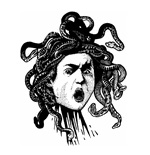
Gorgon Theology
LETTER FROM ENGLAND
In March I flew across the pond to deliver a guest lecture in the 24th annual Philosophy Symposium at California State University at Fullerton. Other participants included theologian Ninian Smart, philosopher of religion D.Z. Phillips, and feminist Emily Culpepper. The subject was “Rationality and Spirituality,” and I was particularly interested in hearing what contemporary feminism had to do with them.
Past experiences with feminists had not offered much encouragement. After a lecture of mine on the right to life at the School of Law of the University of Missouri at Kansas City some years ago, a feminist opened the discussion with the assertion: “Dr. Montgomery, you have no right to speak on the subject of abortion: You are not a woman.” I replied in the words of my old Cornell philosophy mentor and Wittgenstein interpreter Max Black: “True as to my sex, Madam, but epistemologically irrelevant.”
Emily Culpepper, a Harvard Th.D., appeared wearing a T-shirt emblazoned with the feminist double-axe logo, and spoke for an hour without once quoting a male theologian. Her sources were such standard feminist writers as Mary Daly and “Starhawk.”
Mary Daly, in her well-known essay, “After the Death of God the Father: Woman’s Liberation and the Transformation of Christian Consciousness,” sets forth the theme of theological feminism: “The Judaic-Christian tradition has served to legitimate…patriarchal society.” A feminist theological revolution will mean an ethical revolution: “The becoming of women implies also a transvaluation of values in Christian morality…which will go far beyond Nietzsche’s merely reactionary rejection of Christian values.” But, as a matter of fact, subsequent to writing this passage, Daly herself opted for rejection of those same values.
You May Also Enjoy
Answer: when he is a Messianic Jew. According to Israeli law, a Jew ceases to…
“Priests and bishops and popes are usually good men, often very good men. But they’re still only men, not always capable of really heroic courage," said the theologian.
Considering the quantity of literature on abortion that has poured from the academic and popular…

